In the unstable world of the music industry, instinct and intuition are invaluable commodities. When Karl Walterbach founded the legendary Noise Records back in 1983, he was undoubtedly using both. A diehard punk rock fan from Berlin, Karl didn’t even like heavy metal when he branched out from his earlier project, Modern Music: a prolific underground label primarily dedicated to German and US punk bands. Having started in the DIY scene, putting on shows in basements and squats in Berlin’s Kreuzberg district, Karl had forged a strong relationship with US-based SST imprint and, through that, hardcore punk legends Black Flag, and it was through this international meeting of minds that Noise emerged.
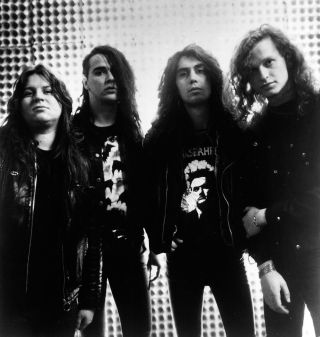
“In fact, Greg Ginn [Black Flag guitarist] introduced me to metal,” Karl says today. “Every time he played in Hanover he was raving about the Scorpions. I didn’t understand it because I found them goofy! But in Los Angeles he took me to some of their shows with local metal bands, and then I was more interested. That was the time when the first Metallica and Slayer records and the first Metal Massacre compilation album from Metal Blade came out. I took all that stuff home and I thought, ‘This is great stuff, it’s so out of the box!’”
It’s not hard to see the parallels between the punk underground and the nascent thrash metal scene that caught Karl’s eye. Metallica and Slayer were kickstarting a musical revolution and it was one that knowingly shunned the polish and politeness that were deemed necessary for mainstream success.
“Punk was in decline and I could see something exciting in the metal scene,” Karl recalls. “So I started Noise, picked up a few bands and did compilations, including the so-called Death Metal compilation in ’84. I signed Grave Digger, Hellhammer, Helloween, Running Wild and Kreator… but if I was signing bands today I probably wouldn’t sign a single one of them! Standards are much higher these days, ha ha ha!”
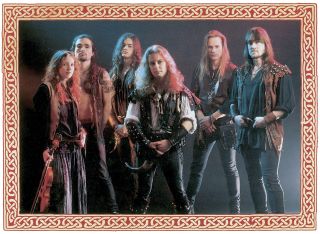
Having taken a punt on the metal scene, with a firmly European focus, Karl had inadvertently stumbled upon a handful of bands that would go on to completely alter the face of heavy music. More traditional fare like Helloween and Running Wild would have a great impact on the power metal scene that erupted during the late 90s, but it was the signing of a peculiar band of Swiss youngsters called Hellhammer that would send the strongest ripples around the metal world, as they soon transformed into one of the most influential bands in metal history.
“Hellhammer was a copy of Venom, and a bad copy!” Karl laughs. “Venom had balls, even if the music was very badly played. It was that bigger-than-life image that I liked. If I look at Hellhammer it was there too, the same vibe, and then they turned into Celtic Frost. They really stood out and made an impact. It was a lesson learned because you really need big balls as a band to stick out and be different. Today there are so many copycats all over, and that’s a shame.”
Signed to Noise Records when they were still teenagers, Kreator were effectively the label’s response to the burgeoning US thrash scene. Now firmly established as one of Europe’s most revered metal bands, Mille Petrozza’s crew brought new levels of intensity and chaos to thrash, as showcased on their thrillingly primitive 1985 debut, Endless Pain, and its immortal follow-up, Pleasure To Kill. Today, Mille cheerfully regards Karl’s decision to sign his band as a miraculous event.
“We were incredibly surprised that anyone wanted to sign us!” he laughs. “A friend sent Karl our demo tape, but we didn’t feel like we were as good as other bands at the time and we were still very young. My mother had to sign my record contract! I was only 16 or 17 years old at the time, so it was like, ‘OK, let’s make an album…’ It was a once-in-a-lifetime chance and maybe we’d never get to make another album, so we just hoped it would sound cool. That was our career plan, ha ha ha!”
More than three decades on from signing with Noise, Mille is happy to salute his former collaborator.
“Karl was always very supportive and if he hadn’t signed us, maybe we would have signed to a shitty label that wasn’t able to support us in the same way,” he muses. “Noise was the perfect label for us at the time. I don’t think a major label would’ve touched us, so we’re very thankful.”
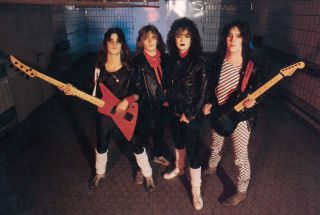
Kreator were soon joined on Noise by thrash brethren Tankard, Coroner and the UK’s own Sabbat: proof that Noise’s contribution to the European thrash scene cannot be overstated. Karl was also savvy enough to look to the other side of the Atlantic and sign progressive Canadian oddballs Voivod, who were momentarily unsigned after releasing their War And Pain debut via Metal Blade in ’84.
“We moved to Montreal in the summer of 1985 and started working on our second album, Rrröööaaarrr, but we had no record deal,” drummer Michel ‘Away’ Langevin explains. “We had our gear stolen and were living above a strip bar downtown, getting poorer and poorer. But we organised a big show in Montreal with Celtic Frost and we gave a rough mix cassette to [Frost bassist] Martin Ain. He took it back to Europe, gave it to Noise and we ended up with a three- album deal. It was an amazing turn of events!
“Thanks to Noise we have great memories of being in Berlin to record our album, Killing Technology, in 1986,” the drummer continues. “It was very strange, because the Berlin Wall was still there. We tried to get to East Germany a couple of times but they said we looked funny and we had to turn around, ha ha ha!”
Albums like Celtic Frost’s Into The Pandemonium and Voivod’s Dimension Hatröss brought unprecedented levels of creative bravery to heavy music, and it’s impossible to imagine today’s metal scene looking even vaguely similar without their impact. However, Noise Records’ greatest commercial triumph belonged firmly in more traditional realms, as early signings Helloween rocketed from nowhere to international glory. Widely viewed as Germany’s answer to Iron Maiden, at least at the time, Helloween’s second and third albums – Keeper Of The Seven Keys, Parts 1 and 2 – made them chart-busting heroes around the world, much to Karl’s delight.
“They sold a million worldwide, with gold records in Japan and Germany,” he recalls. “It was really amazing. Those are huge numbers for an independent label. That’s why Keeper 1 and 2 stick out in my memory. Helloween had great songs. They had the cool, cartoonish image. They sounded fresh and young and they had the looks. It was the perfect mixture at the perfect time. But it can kill a label, a big success like that. You’re constantly re-pressing the records, 50,000 or 100,000 units, and you’ve got to pay the bills! One day I received a call from the pressing plant and it was the owner, saying ‘You owe us 400,000 Marks! This can’t go on!’ I said, ‘But I’m a big hit!’ and he said, ‘That’s great, but I don’t care. Send me some money!’”
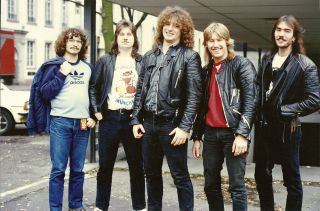
After the good years came the not-so- good years. The 90s was a tricky time for metal generally, of course, but Helloween’s success at least enabled Noise to enter the decade in good shape. Unfortunately, a proposed deal with EMI Germany involving Helloween and several other acts disintegrated into a flurry of lawsuits that briefly threatened to kill the label off. The courts eventually found in Karl’s favour, but the musical wind was blowing in a different direction and so he took the plunge and moved to Los Angeles for the rest of the decade.
“I needed to change my life and to get some fresh air!” Karl recalls. “We survived the lawsuits but I became very demotivated. It’s logical that metal would decline. Any successes we had in the 90s were overshadowed by changes in market tastes and then the internet changed everything.”
Despite having notched up some huge triumphs while changing the course of heavy music on several occasions, Karl witnessed the dawn of the downloading age and realised the music industry was about to implode. He sold Noise in 2001 and has since been working in management, still helping bands but from a different viewpoint.
“Ultimately, how can you compete against free music?” he shrugs. “I was ahead of the curve and sold up for a decent price. I sold my publishing company in 2006 and its value had decreased by three-quarters. That tells you what happened to the industry.”
2016 saw a series of lavish re-releases from Noise’s inestimable catalogue, including classic albums from Celtic Frost, Voivod and Kreator. Damn The Machine, a book detailing the life and times of the label that must surely rate as one of the smartest leaps of faith ever made, was released in March (see Tome Raiders, right).
“No, I wasn’t a metalhead but I just felt that something was brewing all those years ago,” he concludes. “I liked the energy and the attitude. What matters is persistence, building a fanbase, good live performance and identity. If you play metal, you’re in there for the long haul.”
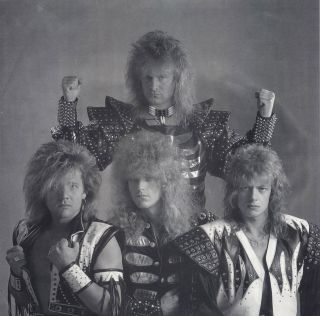
Tome Raiders
Olivier Badin talks to David E. GeHLke, author of Damn The Machine – The Story Of Noise Records
Written by Pittsburgh-based heavy metal journalist, David E. Gehlke, Damn The Machine is centred around Noise Records’ key bands but also the complex personality of Karl Walterbach. A great read, it chronicles the trials, tribulations and inner workings of a record label in the 80s and 90s.
How did this project come about?
“I initially interviewed Karl in 2013 for one of the websites I write for and we ended up talking loosely for two or three hours, as he’s a natural storyteller, so I remember getting off the phone and saying to my wife, ‘This guy’s so interesting, I should write a book about him and Noise Records!’ But he first said no – a few times actually! – until I offered to chronicle his early days as a squatter living in Berlin in the punk community as well as capturing both the music business side and the musical side of things.”
Some of the big bands had a negative experience with Noise in general and with Karl in particular. How do you find the right balance in between his vision and others’?
“Indeed, the entire book could have been a big love letter about Noise Records, but what really interested me was the relationship between Karl and his bands as well the behind the scenes aspect of the music industry. People often forget that what goes on behind the scene has a tremendous effect on how albums are released or how bands’ careers develop. Look at Helloween: after the Keepers albums, they were on their way to the top but in 1989, they tried to get off from Noise after they got involved with both EMI and Rod Smallwood. It didn’t work out and as a result, their career was derailed. Had none of that happened, do we get the notoriously hated Pink Bubbles Go Ape album? Does Kai Hansen leave the band? We’ll never know.”
Did anyone refuse to be interviewed for the book?
“I was turned down by only two people. First, Rod Smallwood; although he’s known as Iron Maiden manager, he was also taking care of Helloween in the late 80s and throughout the 90s and, of course, was behind Sanctuary Records, who bought Noise back in 2001, so it would have been great to pick his brain about how he and Karl confronted each other, but his office answered politely that Rod doesn’t do any interview when it’s not about Maiden. I also really wanted to talk to Tairrie B, the frontwoman of Manhole and later Tura Satana. They were two of the label’s biggest metal bands in the late 90s but Tairrie said she had such an acrimonious relationship with Karl that she felt she wouldn’t be able to talk objectively about her days on the label.”
Deadly Dins
Top 10 Classic Noise Tracks
Grave Digger - Headbanging Man [Heavy Metal Breakdown, 1984]
Snapping at the heels of Scorpions and Accept, Grave Digger’s thunderous assault was integral to the 80s German metal blueprint.
Hellhammer - Triumph Of Death [Apocalyptic Raids EP, 1984]
Essentially – and intentionally – like listening to Venom at half-speed, Tom G Warrior’s first band were an ugly but seminal sonic nightmare.
Kreator - Flag Of Hate [Endless Pain, 1985]
The kings of German thrash summed up their homegrown scene’s feral intensity at the first attempt. An immortal anthem. Raise! The Flag Of Hate!
Celtic Frost - Circle Of The Tyrants [To Mega Therion, 1985]
Emerging from Hellhammer’s primitive ashes, Celtic Frost’s creative blossoming produced numerous hellish classics, none more fearsome than this one.
Helloween - Future World [Keeper Of The Seven Keys Part 1, 1987]
The most successful band in Noise Records history, Helloween’s speed metal singalongs were a cartoon riot made flesh. No wonder the world succumbed.
Voivod - Tribal Convictions [Dimension Hatröss, 1988]
Thrash metal’s pioneering Canadian weirdoes were so far ahead of their time, angular mini-epics like this one still sound like the future. Canucking genius.
Sabbat - A Cautionary Tale [History Of A Time To Come, 1988]
This face-melting opener from Sabbat’s debut remains a thrillingly vicious reminder of their unique, evocative and hugely influential thrash attack.
Running Wild - Under Jolly Roger [Under Jolly Roger, 1987]
Long before Alestorm reared their heads, Running Wild were bringing metal and nautical criminality together, with thunderously daft consequences.
Skyclad - The Widdershins Jig - [The Wayward Sons Of Mother Earth, 1991]
After leaving Sabbat in 1990, Martin Walkyier formed Skyclad and, with this boisterous, fiddle-driven anthem, produced a handy template for the entire folk metal scene.
Coroner - Internal Conflicts [Grin, 1993]
Switzerland’s answer to Voivod, Coroner hit a creative peak in the mid-90s. Put Celtic Frost, Ministry and Rush in a blender and you’re halfway there.
Damn The Machine: The Story Of Noise Records by David E Gehlke review


